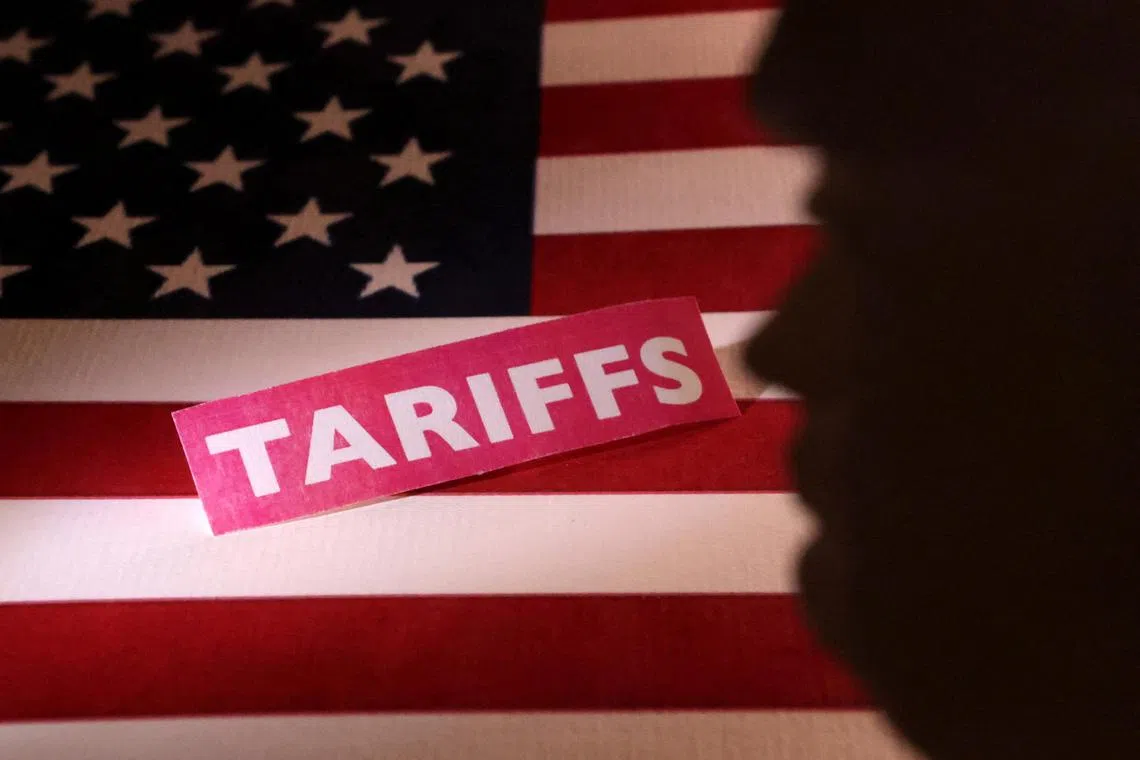Trump feeling some tariff pain too, as his approval ratings take a hit
Sign up now: Get ST's newsletters delivered to your inbox

Mr Trump’s approval ratings are cracking in numerous opinion polls, and are especially negative on the question of his handling of the economy.
PHOTO: REUTERS
WASHINGTON – US President Donald Trump’s broadside on the economic system that the US largely created after World War II is having repercussions at home.
And not in a good way.
Mr Trump’s approval ratings are cracking in numerous opinion polls, and are especially negative on the question of his handling of the economy, a point of pride for the businessman-turned-president.
His sliding popularity has also emboldened dissent within his own party.
A budget Bill embodying his key governance priorities squeaked through in the House of Representatives with a narrow majority on April 10 – but only after Speaker Mike Johnson carried on tense late-night negotiations with a group of about 20 holdout Republicans, and Mr Trump warned them to “stop grandstanding”.
Even so, two Republicans – Mr Thomas Massie of Kentucky and Ms Victoria Spartz of Indiana – joined Democrats in opposition.
At issue was support for trillions of dollars in tax cuts, a debt ceiling of US$4 trillion (S$5.3 trillion) and hundreds of billions of dollars in spending on defence, energy and immigration.
The Republican Party’s fiscal hawks, including members of the ultra-conservative Freedom Caucus, had to be persuaded by Mr Johnson to suspend their doubts over the level of spending cuts – which they felt were not deep enough – envisaged in what Mr Trump has been touting as his “big, beautiful Bill”.
The Senate version of the Bill, adopted on April 5 with another narrow 51-48 vote, outlines about US$4 billion in spending cuts over a decade. The more aggressive House version seeks US$1.5 trillion pared from federal programmes and services in that period.
Had Mr Johnson failed, it would have been a colossal setback for Mr Trump at a time when unhappiness has bubbled to the surface over his trade wars.
Bill, lawsuit to check on Trump’s power on tariffs
In another embarrassment for the President, seven Republican senators have signed a Bill that would rein in presidential power on tariffs. The Constitution mandates that the legislature, not the executive, controls the purse strings of the government.
Mr Trump has threatened to veto the Bill, which would require him to notify Congress of any impending tariffs within 48 hours. Congress would have to approve of the action within 60 days of notification.
In yet another challenge, a group of conservative-leaning legal advocates have filed a lawsuit against Mr Trump’s justification of tariffs with a claim that “foreign trade and economic practices have created a national emergency”.
The suit, filed in Florida, was brought on behalf of Simplified, a small company that relies on Chinese-made materials to sell planners, stationery and other paper products.
It challenges Mr Trump’s executive orders of February and March, which placed tariffs on imports from China, Canada and Mexico, The New Yorker reported.
The case would also have implications for the so-called Liberation Day tariffs,
On April 2, he announced a “baseline” 10 per cent levy on all imports, including from Singapore, and on April 9, “reciprocal tariffs” ranging from 11 per cent to 50 per cent on more than 70 nations that run a trade surplus with the US.
Later on April 9, he abruptly ordered the lowering of the reciprocal rates to 10 per cent for a 90-day period, during which negotiations will be carried on to produce “tailor-made” tariffs for allies and other trading partners. Taxes on Chinese imports, however, remain set at a minimum of 145 per cent.
Disapproval ratings going up
But the tariffs – a word that Mr Trump often calls the most beautiful in the dictionary – seem to have turned off Americans.
The President’s approval ratings dipped noticeably in a batch of surveys that captured the announcement of the tariffs, but not their sudden reversal within a week.
He merited 41 per cent approval and 53 per cent disapproval in a Quinnipiac University survey of 1,407 registered voters, conducted from April 3 to 7 and released on April 9.
During his first week in office in late January, he had earned 46 per cent approval to 43 per cent disapproval ratings in the same poll.
Specifically on the question of handling of the economy, on which Mr Trump has typically been getting good grades throughout his political career, he scored 40 per cent approval and 55 per cent disapproval.
Even more tellingly, only 39 per cent of respondents said they approved of this trade policy, while 55 per cent disapproved.
Americans don’t believe pain will be short-term
Nor are they buying the President’s claim that the pain from the tariffs will be fleeting.
“Will time reduce the pain? Some think it will, but a majority don’t envision that happening,” said Quinnipiac University polling analyst Tim Malloy.
Another poll, conducted between April 4 and 7, showed that 72 per cent of Americans believe the tariffs will make everyday goods more expensive.
Nearly as many expect the tariffs will cause a short-term recession, showed the poll by HarrisX, a global market research, data analytics and strategy consulting company.
Findings from a more Republican-leaning Rasmussen poll offered no consolation either.
Its daily tracker showed Mr Trump’s approval rating on April 10 at 47 points, while the negative sat at 52 points. This was the lowest approval figure registered since Mr Trump began his second term on Jan 20.
Bhagyashree Garekar is The Straits Times’ US bureau chief. Her previous key roles were as the newspaper’s foreign editor (2020-2023) and as its US correspondent during the Bush and Obama administrations.



